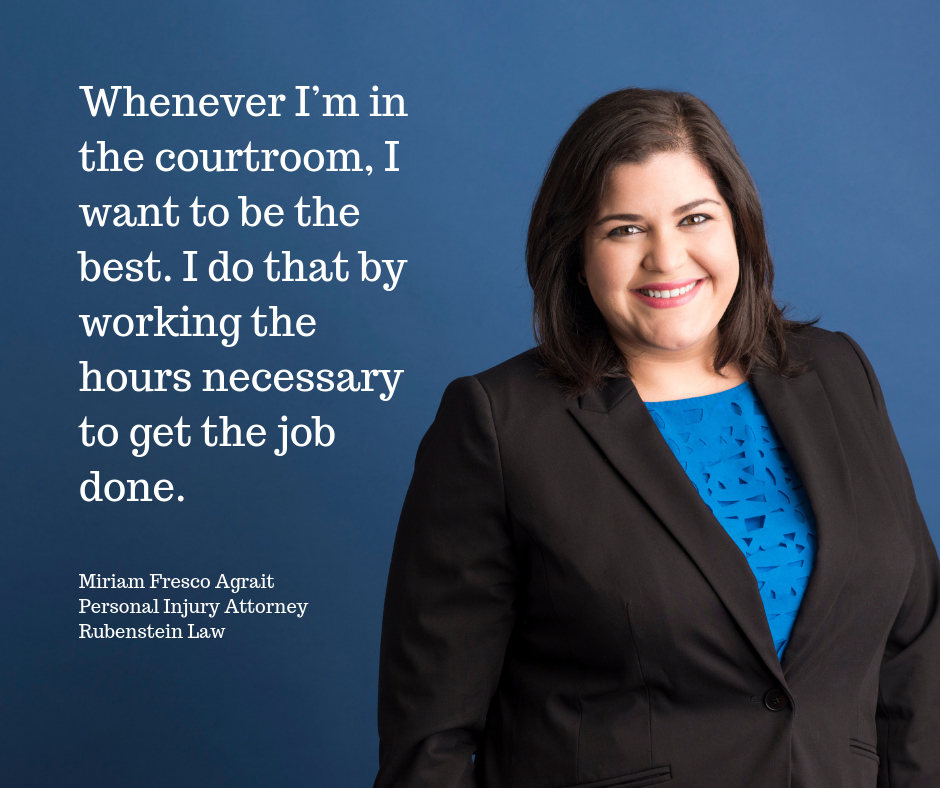Women at Rubenstein Law Share About Their Journey

Written by Blanca Morales for Rubenstein Law
In the world of litigation, women are a rare sight. However, the women at Rubenstein Law prove that they are an asset to the field.
The American Bar Association reported that in 2014, women made up 34% of the legal profession. In private practice law firms, 20.2% of women were partners--4% of which were managing partners in 200 of the biggest law firms.
Rubenstein Law is a little different from the average law firm, Miriam noted. “You are given an opportunity from the moment you get here, to try cases and take that next step.”
Six of Rubenstein Law’s partners are women, including the COO, Nicole Rubenstein and the Managing Partner, Ninfa Schmidt. Almost half of the 46+ attorneys at the firm are women.
“To be a woman litigator means you have to be strong and confident,” said attorney Lisa-Gaye Smith. She believes women bring value to litigation.
“Women in law bring warmth and approachability. As women, we’re compassionate and caring, which goes a long way.”
Lisa-Gaye knew she wanted to be a lawyer since she was seven years old. Her parents noted her potential. As a child, whenever she was refused a cookie to snack on, Lisa-Gaye made persuasive arguments to prove why should have her favorite treat. When they told her she would make a great attorney, she took it to heart.
She explained that clients appreciate simple gestures like presence and attentive listening. “It matters more to them that you call them, meet with them to see how they’re doing or visit them at the hospital. We can’t be objective in our approach.”

“It’s very humbling that someone trusts you enough to represent them,” said Miriam. “If you can’t appreciate the intensity of trust from your clients, then you can’t be a good lawyer. Our profession could be exhausting and grueling, but it’s a beautiful thing when you consider the way clients trust in you. It’s an honor to represent them.”
Like her colleagues, Miriam also knew she wanted to be a lawyer from the days she would visit her mom, a paralegal, at her office when she was growing up. When she saw the attorneys “looking like they were doing something important,” it inspired her to work to defend others.
“I’ve always looked up to women who have paved the way,” she said. “The kind of woman who’s not afraid to rock a bright dress, instead of a black suit, to court. Ones who look for ways to be womanly in a man’s world. I think of my mom. People respected her. And she enjoyed her work.”
Ask any lawyer about the journey toward their career, and they’ll tell you: “It’s not easy.” The hours are long and the schedule is demanding. Gaining a law degree is a matter of being organized, knowing your priorities, and being determined, said Managing Partner, Ninfa.
Ninfa is considered a success story at the firm. She began at Rubenstein Law when there were only six people on staff, and Robert was the only attorney. After many years of working at Rubenstein Law through a variety of roles, she enrolled in law school in her 30s.

“Many people, upon hearing I was going into law school with three kids, told me I was crazy. They thought I would not go through with it. Yet, one should never worry about how other people might perceive you, because that becomes a distraction. Just show up, do the work and you’ll get to your goal.”
She came back to the firm and became a top performer, offering her managerial skills to create a system that runs efficiently. Younger attorneys now look to her for advice.
“She gave me great tips when I started here,” said Lisa-Gaye, adding that the team environment at the firm allows her to ask questions and seek direction from those who have more experience.
“We’re set up in a way that it’s difficult to not succeed. We have all the resources,” said Ninfa.
While she was in law school, Ninfa dedicated her days off from class to her children. Once they were in bed, she woke up at three in the morning to prepare for class.
“You have to know what you need to do and make no excuse,” she added.
“This isn’t a job you do for the money,” Miriam said. “It can be very tough. Litigation is set up in a way that is difficult if you have a family. There are a lot of sleepless nights and sacrifice to be willing to do well in this field. You’d have to sacrifice to be involved in your children’s lives—like giving up a bit of social life.”

Miriam said she relies on another feminine strength: multitasking. “Whenever I’m in the courtroom, I want to be the best. As women, we put a lot of pressure on ourselves to be number one at everything—work, PTS meetings, at home. But we have to come to terms with the fact that not every aspect in our lives will be perfect and seamless. We won’t always look Instagram-worthy, and that’s OK.”